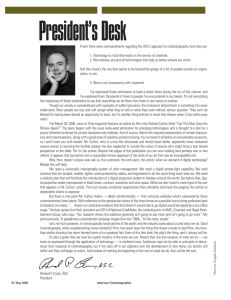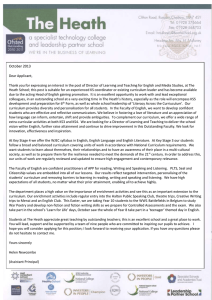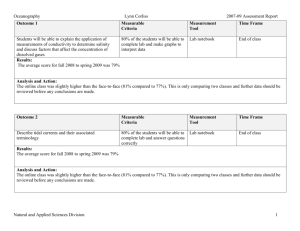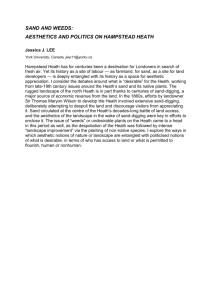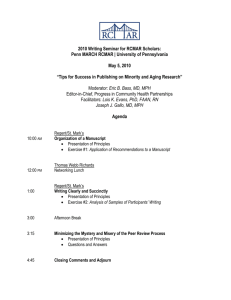Womanist Ethics and Inequality in Women's Mental
advertisement
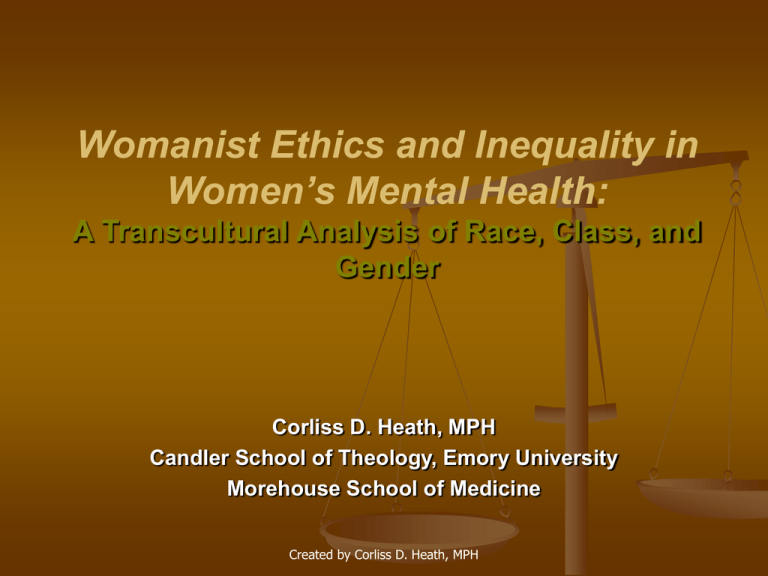
Womanist Ethics and Inequality in Women’s Mental Health: A Transcultural Analysis of Race, Class, and Gender Corliss D. Heath, MPH Candler School of Theology, Emory University Morehouse School of Medicine Created by Corliss D. Heath, MPH Definition of Womanist As defined by Alice Walker in her book, In Search of Our Mother’s Garden: Womanist Prose, a womanist is a black feminist or feminist of color. Committed to the survival and wholeness of entire people, both male and female. Not a separatist, except periodically for health. Created by Corliss D. Heath, MPH PURPOSE To address the issues of inequality in women’s mental health from a womanist perspective. To examine the particularities and universality of black women in the United States, Caribbean, and South Africa and their experiences with accessing mental health care and treatment. Created by Corliss D. Heath, MPH BACKGROUND Black women’s health is a cultural production of biological, social, environmental, and economic conditions impacting their quality of life. Black women’s methods of coping in a white male structured society are based upon their own cultural conditions. Created by Corliss D. Heath, MPH Inequality in Mental Health The World Health Organization defines health as a complete state of physical, mental, and social well-being, not merely the absence of disease or infirmity. Women’s health involves the emotional, social, and physical well-being and is determined by the biological, social, political, and economic context of their lives. However health and well-being eludes the majority of women and even more so black women. Mental disorders related to marginalization, powerlessness, and poverty along with overwork and stress are growing concerns for black women. Yet there is a significant gap between the mental health resources that black women need and the resources that actually exists. Created by Corliss D. Heath, MPH Inequality in Mental Health There are a lack of studies in mental health directed towards black women, thus information concerning women of African heritage and mental health is not readily available. For black women who face sexism and class disadvantage, the adoption of negative attitudes among mainstream health clinicians can translate into negative treatment options in some cases and denial of access to appropriate treatment in others. In the same regards that male therapists devalue women by looking for a medical or biological reason for explaining abnormal behavior, white feminist therapists devalue black women by not recognizing that traditional constructs of mental health need to be expanded to include ethnic and cultural diversity. Created by Corliss D. Heath, MPH Beijing Platform for Action The Beijing Platform for Action states that women have the right to enjoy the highest attainable standards of mental health regardless of gender, race, or class. However, research shows that racial, socioeconomic and gender inequalities strongly impact black women’s experiences with mental health care and treatment. Created by Corliss D. Heath, MPH Increase women’s access to appropriate, affordable, and quality mental health care: (a) Reaffirming the right for women to enjoy the highest attainable standard of care by incorporating the affirmation in national legislation and policies to reflect a commitment to women’s mental health; (b) Ensuring that all mental health service workers conform to human rights as well as ethical, professional, and gender sensitive standards in the delivery of women’s mental health services; (c) Design and implement mental health programs that are gender sensitive and addresses the needs of all women regardless of socioeconomic status or cultural differences; (d) Taking measures to eliminate inappropriate medication and overmedication of women as well as making sure that all women are informed of their options in treatment and care. Created by Corliss D. Heath, MPH Promote research and disseminate information on women’s mental health: (a) Conducting mental health research that allows for the use of data collected and analyzed to include variables providing specific demographic information, such as sex, age, and socio-economic status; (b) Increase funding for preventive behavioral, and epidemiological health service research on women’s mental health issues as well as research on the social, economic, and political causes of women’s mental health problems and consequences. Created by Corliss D. Heath, MPH Increase resources and monitor follow-up for women’s health: (a) Increasing budgets for mental health care and services, with adequate support for follow-up care and treatment; (b) Develop mental health services and preventive health programs that promote gender sensitive community-based participation and selfcare; (c) Give higher priority to women’s mental health and develop mechanisms for coordinating and implementing the health objectives of the Platform for Action and relevant international agreements to ensure progress. Created by Corliss D. Heath, MPH RATIONALE Women of postmodern and third world cultures have questioned the applicability of international human rights documents, given that they are usually Western derived and developed in the absence of and largely without regard to women from non-western cultures. However for this paper, we will focus our attention to whether or not the applicability of the Beijing Platform for Action is extended to include black women of African heritage. Created by Corliss D. Heath, MPH METHODS A transcultural analysis of women’s mental health articulated as a human right in the Beijing Platform for Action and the concern of inadequate care and treatment that disproportionately affects black women due to race, class, and gender. Examine and critique the Beijing Platform for Action (drafted in 1995) using the universality and particularities of black women of African heritage to determine whether or not the document’s identity of the subject of human rights is universal for all women in all cultures, given the intersectionality of gender, race, and class of black women often has more significant differences than commonalities. Created by Corliss D. Heath, MPH Observations Created by Corliss D. Heath, MPH Universality of Black Women Caribbean United States South Africa Created by Corliss D. Heath, MPH Universality of Black Women Black women are not only oppressed by the constructs of white supremacy in the larger society, black women also have to endure the oppressive strongholds of sexism and classism that occur within their own racial and ethnic communities. Despite nationality, marital status, or educational background, all black women, whether in the United States, the Caribbean, or South Africa, experience either the combined or independent effects of racism, sexism, classism, and oppression, both internally and externally. Created by Corliss D. Heath, MPH Particularities of Black Women Caribbean South Africa United States Created by Corliss D. Heath, MPH Particularities of Black Women Black women of African heritage share a universal bond of many commonalties, yet the tradition of gender roles, differ in respect to their individual cultures. While black women collectively struggle to survive in a world filled with mental anguish, physical abuse, and emotional agony, by assimilation and compliance, black women may respond differently to culture gender role norms. Created by Corliss D. Heath, MPH Black Women in the United States Black Women in the Caribbean Black Women in South Africa Born into a social environment, historically filled with racist, sexist, and classsist oppression that institutionalizes the devaluation of African-American women as it idealizes their white counterparts. Possesses a culturally rich heritage of languages, religions, and ethnic diversities, where religious beliefs and practices are vital components of her culture. Born into a culture where gender has been used by societal institutions to dominate and subjugate black women as members of a disenfranchised group. Often exploited and stereotyped as being inferior, lacking sexual restraint, and being less intelligent than their white counterparts. Views race differently since blacks are in the majority. Oppression becomes more of a function of intra-cultural dynamics. Within their own culture, are treated and valued as possessions. Regardless of socio-economic status or education level, will experience a high rate of depression and low self-esteem, due to feelings of deficiency in their roles in society. Women do not talk about their problems, emotions are seldom expressed verbally, and there is very little if any discussion about issues of mental health. Poor mental health is a major concern and is often the result of the adverse socio-political conditions. Often accused of harboring violent tendencies or of being ‘angry’. Believes that when things go wrong in life it is either the result of something they’ve done or witchcraft. Little to no information on women’s mental health due to Colonial psychiatrists’ notions of the “happy native theory”. Many internalize the stereotype of strong matriarch, where she acknowledges no personal pain, can bear all burdens and will take care of everyone. Historically mental health care has not been a positive experience. Many who seek mental health care are more than likely to be detained in locked wards of psychiatric hospitals, diagnosed as suffering from schizophrenia or receive extremely high dosages of medication. Colonial psychiatrists have said that depression does not exist in black South African culture because “depression is something that happens in the realm of sophisticated people, not primitive people (i.e. black South Africans). Created by Corliss D. Heath, MPH RESULTS Although the Beijing Platform for Action was written as a universal framework advocating women’s rights, racism and classism prohibits the document from functioning with a universal understanding. Mental health is a multi-dimensional issue requiring a multi-dimensional approach to addressing it. Created by Corliss D. Heath, MPH Transformation in Mental Health Care for Black Women If the Beijing Platform for Action is to have any relevance to women everywhere, specifically black women of African heritage, racists concepts and conceptions of cultural forms and habits, must be challenged. Mental health has many different meanings that are comprised of several dimensions. Not only does it concern the issue of medical maintenance; but it extends to include the cultural dynamics of religion and ethics. Created by Corliss D. Heath, MPH Transformation in Mental Health Care for Black Women Mental health reform from a womanist perspective means: (1) understanding that black women’s life experiences under oppression are real and should be included in standards of care; (2) exploring an interdisciplinary approach of religion, ethics, and public health, in order to provide black women of African heritage with adequate mental health care and treatment. Created by Corliss D. Heath, MPH CONCLUSIONS To declare mental health rights for “all” as stated in the Beijing Platform for Action, we must consider how cultural differences impact women’s rights, specifically black women. Thus an anti-racial ethic of care and cultural competency is required in mental health practice to improve inequalities among black women. The Beijing Platform for Action sought to identify women’s rights as human rights, which includes equality in mental health care. However, we find that differences of race, ethnicity, and culture determine the difference of whether or not women of African heritage are considered as human or not. Created by Corliss D. Heath, MPH
